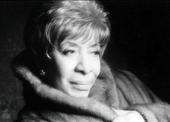composer, singer, pianist
Born; Washington, D,C., 5-1-1934
Died; Washington, D,C., 10-20-2005
CLICK HERE to listen to Shirley reflect on her career
A child prodigy, Shirley Horn began playing piano at age 4 and the next year started formal musical training. She became so obsessed with the piano that her mother offered her bribes in an attempt to get her away from the instrument so she would play with the neighborhood children.
At just 12 years of age Horn studied composition at Howard University and at 18 was awarded a scholarship to study at Julliard in New York. Unfortunately her family was unable to afford her money for living conditions in New York. Instead she entered a special music studies class at Howard, leaving after several years to work full time in Washington D.C.
In 1960 Horn traveled to New York to record her first album Embers And Ashes. Although the record appeared on only a small label and received limited distribution it immediately established her as a gifted and sensitive jazz artist. So impressed was Miles Davis when he heard the disc he brought Shirley back to New York to appear with him at the Village Vanguard, a popular jazz venue in the city. Soon she was working in major clubs throughout the U.S., recording with Quincy Jones for Mercury Records, and singing on the movie soundtracks of For Love Of Ivy and A Dandy In Aspic.
Creative differences with Mercury and domestic life, in particular her young daughter Rainy, called her back home, and for more than a decade, she restricted her appearances to Washington D.C. area clubs and concerts.
In 1981, Paul Acket, director of Hollands North Sea Jazz Festival, caught her impromptu performance at a Jazz Times convention at the Shoreline Hotel. He arranged for her European debut at the Holland festival, where delighted audiences and overwhelming critical approval inspired her to revitalize her career.
With her daughter Rainy grown and married, herself the mother of two children; Horn was now at ease to go back on the road. She was soon working with her trio at some of the most prestigious jazz clubs and she recorded four albums. Her association with Verve records, beginning in 1986, cemented her rise in popularity and helped establish her as a top-notch artist worthy of national and worldwide notoriety and fame.
In later years, Ms. Horn performed with artists ranging from Davis, who reunited with her for a rare appearance as a sideman on her 1991 album ``You Won't Forget Me,'' to Wynton Marsalis.
She was nominated for multiple Grammys and won the award in 1991 for best jazz vocal performance. In 2004, Horn was honored by National Endowment for the Arts as a jazz master.
Shirley Horns piano playing drew on the influences of Ahmad Jamal and Wynton Kelly. Her intricacies in harmony bring to mind Duke Ellington. Her notes were always chosen wisely, placed expertly at well-chosen times. She had the rare ability to utilize rhythm through silence much as Count Basie and the aforementioned Jamal. Although these behemoths may come to mind when listening to Horn, she claimed the utilization of those manifestations as very much her own art. She was not an imitator.
Vocally Shirley Horn does not sound like anyone else. Although the way she carried out her vocals was akin to the personal relationship and intensity one feels when listening to Billie Holiday, Carmen McRae, King Cole, or even Louis Armstrong; Shirley Horn was an original. Not a scat vocalist but rather a sensitive vocalist: she presented her lyrics with improvisational bending and changing of notes in an artistic style that is the essence of true jazz.
